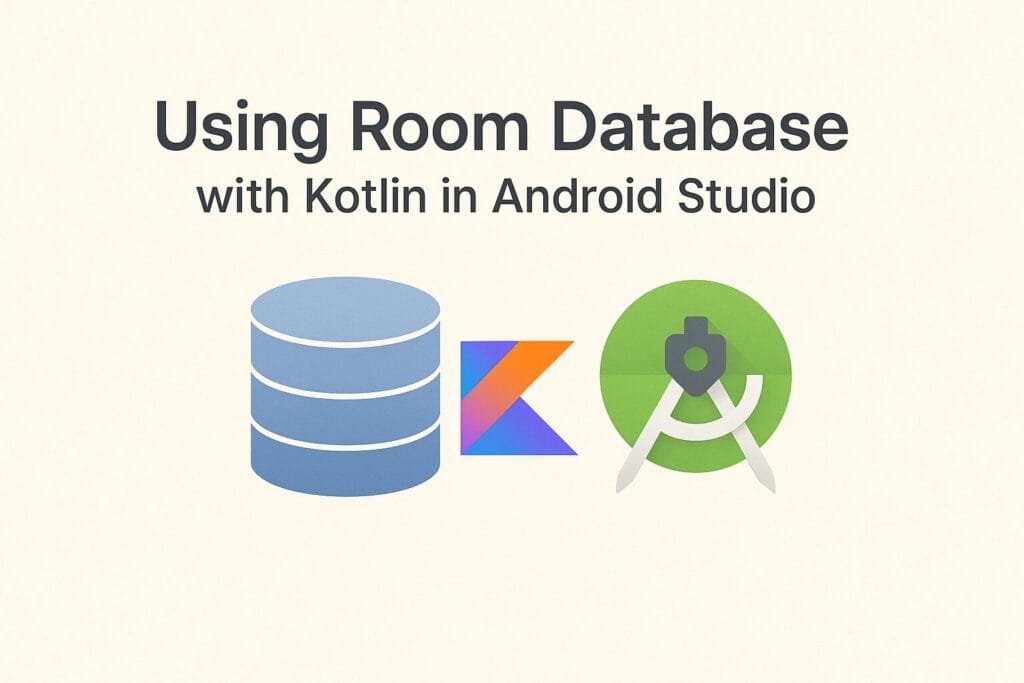When building Android applications that require local data storage, using Room Database with Kotlin is one of the most recommended approaches. Room is part of Android Jetpack’s Architecture Components and provides an abstraction layer over SQLite, which allows for cleaner database access while harnessing the full power of SQLite.

Why Use Room Database?
Room simplifies database implementation by eliminating a lot of boilerplate code associated with SQLiteOpenHelper. It ensures compile-time verification of SQL queries and integrates seamlessly with Kotlin Coroutines, Flow, and LiveData — making it ideal for modern, reactive app development.
Core Components of Room
There are three main components in a Room database setup:
- Entity: This defines a table in your database.
- DAO (Data Access Object): This defines the SQL queries and methods for accessing your database.
- Database: This is an abstract class that holds the database and serves as the main access point.
Basic Example
Here is a minimal implementation of Room in a Kotlin-based Android project:
1. Entity:
@Entity(tableName = "user_table")
data class User(
@PrimaryKey(autoGenerate = true) val id: Int = 0,
val name: String,
val email: String
)
2. DAO:
@Dao
interface UserDao {
@Insert(onConflict = OnConflictStrategy.REPLACE)
suspend fun insert(user: User)
@Query("SELECT * FROM user_table ORDER BY id ASC")
fun getAllUsers(): Flow<List<User>>
}
3. Database Class:
@Database(entities = [User::class], version = 1)
abstract class AppDatabase : RoomDatabase() {
abstract fun userDao(): UserDao
companion object {
@Volatile
private var INSTANCE: AppDatabase? = null
fun getDatabase(context: Context): AppDatabase {
return INSTANCE ?: synchronized(this) {
val instance = Room.databaseBuilder(
context.applicationContext,
AppDatabase::class.java,
"app_database"
).build()
INSTANCE = instance
instance
}
}
}
}
Room vs Traditional SQLite
| Feature | Room | SQLite |
|---|---|---|
| Query Verification | Compile-time | Runtime |
| Boilerplate Code | Minimal | High |
| Kotlin Coroutines | Native support | Manual implementation |
| LiveData/Flow | Seamless integration | Not supported |
Benefits of Using Room with Kotlin
- Type safety and compile-time query checks
- Coroutines support for efficient background processing
- Better separation of concerns with DAO structure
- Simplified database migration
Getting Started
To include Room in your project, add the following dependencies in your build.gradle (app):
implementation "androidx.room:room-runtime:2.6.1" kapt "androidx.room:room-compiler:2.6.1" implementation "androidx.room:room-ktx:2.6.1"
Don’t forget to apply the Kotlin KAPT plugin:
apply plugin: 'kotlin-kapt'
Conclusion
Using Room Database with Kotlin significantly improves your app’s architecture and scalability. It streamlines the way you interact with local storage, supports reactive programming paradigms, and is officially recommended by Google. Whether you’re building a simple to-do list or a more complex offline-first app, Room should be a go-to solution.
For more on best practices and advanced use cases, you can check out Google’s official Room documentation.

